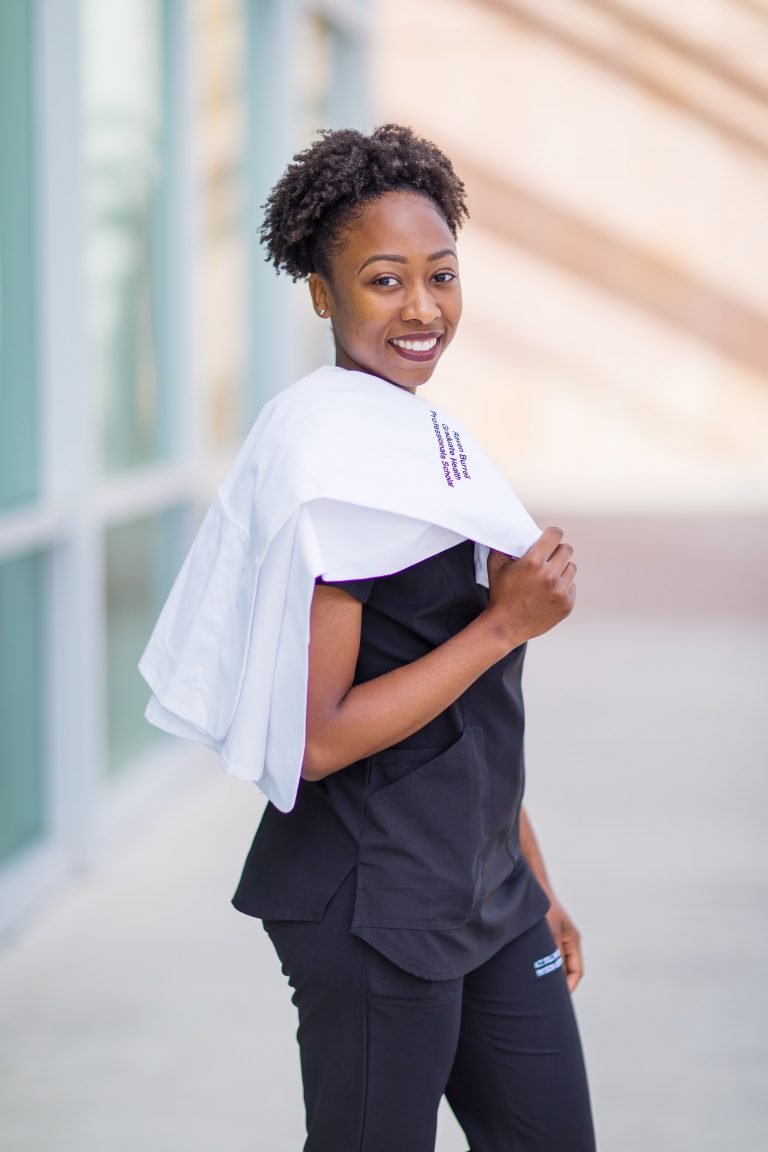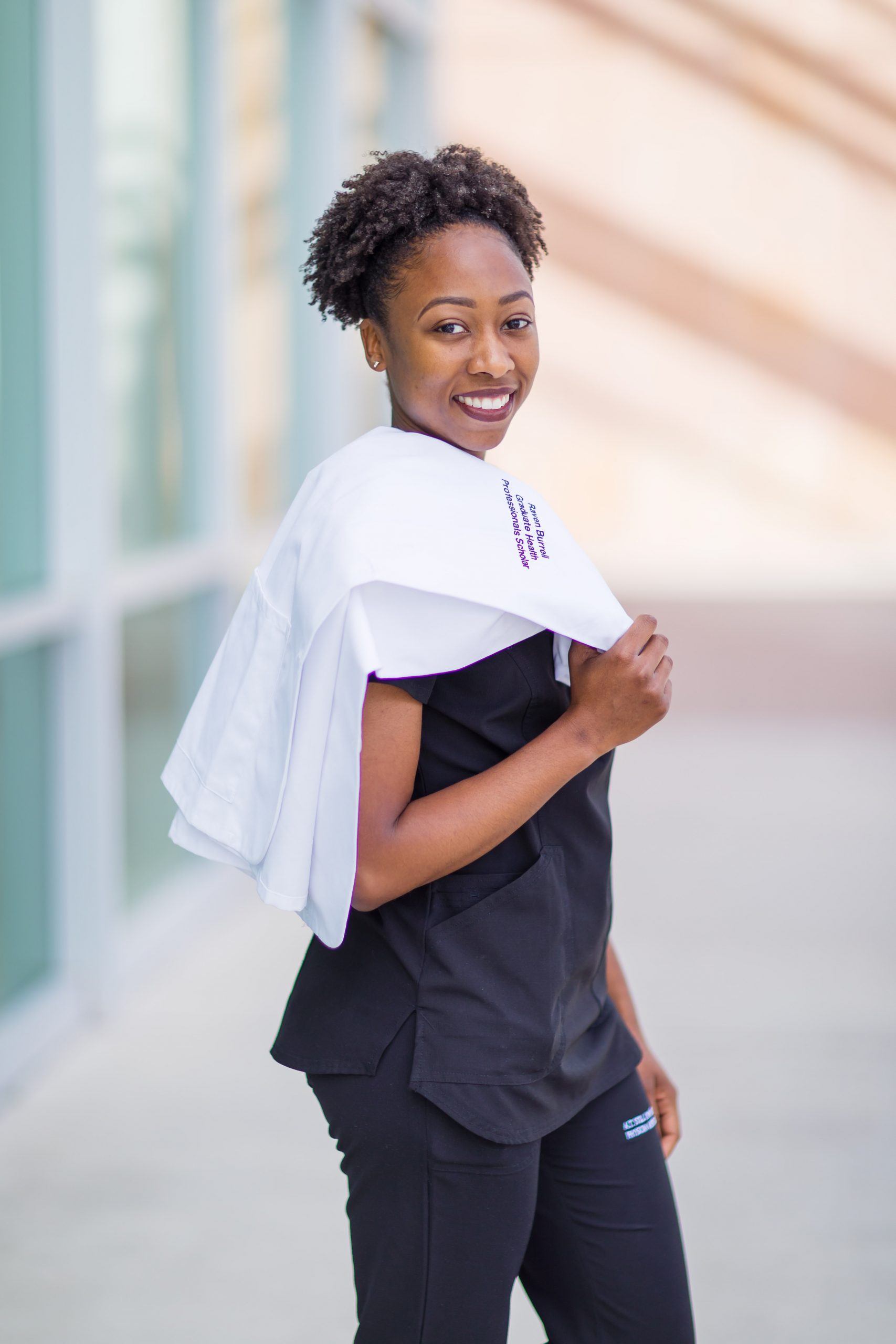Q&A with graduating GPS Scholar Raven Burrell
Posted: August 6, 2020
A.T. Still University-Arizona School of Health Sciences’ (ATSU-ASHS) physician assistant studies student Raven Burrell will graduate Friday, August 7.
Burrell, a second-year student, was a recipient of ATSU’s Graduate Health Professions Scholarship (GPS). The GPS program is designed to accentuate the University’s unique mission of service and leadership in whole person healthcare. Created for historically underrepresented groups, this tuition scholarship is a targeted approach to attract and educate students whose life contributions and experiences are consistent with ATSU’s mission to serve in underserved areas.
Burrell took some time to respond to questions about her time at ATSU, the importance of GPS, and her future plans.
Q: What was the biggest obstacle that stood in the way of your dream to become a physician assistant? How were you able to overcome that obstacle?
A: As a first-generation student achieving higher education, I had an awakening to balance financial necessities and extra-curricular passions. During my undergraduate studies, I had to work to support myself. As a working student, it was hard for me to manage work, extracurricular organizations, and school simultaneously. During that time, I did not know how to adequately multi-task everything, because I was so worried about staying in school, affording books, and living expenses. My passion was to ensure the equity and advancement of students of color. Therefore, I held presidential positions in organizations and led overnight-stay programs for high school students who were accepted to my undergraduate school. I had to give up some of these activities, because I was sacrificing my nutrition and my grades. School and personal life is a balance, and both require time and hard work. I’ve learned the importance of having a schedule and prioritizing things that are beneficial to me. Yes, school is important, but I must be whole body, mind, and spirit in order to be successful and help others.
Q: How did the GPS program affect you?
A: Being a GPS scholar gave me the opportunity to connect with colleagues who have a similar interest and passion to work in underserved communities. We have thoughtful and engaging conversations about tackling social injustices and barriers to health determinants that we grew up in. It is not just having a career, because we are truly passionate about going back into our communities through education and self-service factors to make impactful, positive trajectories within our community. Furthermore, being a GPS scholar allows you to have an additional family with staff who are very supportive and encouraging. Everything about the GPS program is intentional to make sure that each graduate has the tools they need to succeed professionally and personally.
Q: What are some of your greatest achievements throughout your time at ATSU?
A: During my time at ATSU, one of my greatest achievements was becoming a scholarship recipient of the National Health Service Corp in 2019. It was always my goal to work in an underserved community, which aligns with my long-term goals and provides me with financial support.
During my didactic year, I was one of the volunteers and mentors at Red Mountain Crossroads, a substance abuse rehabilitation facility. In addition to the comprehensive physical examinations we provided, I was also involved in leading an innovative smoking cessation program. Over the 14-week period of motivational interviewing and smoking cessation education, the program had a 15% success rate of participants who stopped smoking and 80% who decreased their average daily use.
My long-term goal is to provide programs to inspire youth to enter the medical field. Gary Cloud, PhD, MBA, vice president of university strategic partnerships and diversity, allowed me to bring 10 members from my church to the first Daring our Children to Dream program in the winter 2018 semester. The participants learned about different medical careers, toured the campus, and participated in a variety of medical-focused activities. Representation and early exposure to the medical field is important to me because I was inspired by underrepresented medical providers to make my dream a reality. I am passionate about making grass-root changes for the next generation to come so they have a clear pathway to follow.
Q: What advice would you give to other students who are interested in attending medical school, but might be struggling to make that dream a reality?
A: My religion and prayer continue to keep my faith. God literally brought the right people in my life to keep me focused on my goals. Take advantage of every opportunity that is available to you, because you never know who you might meet to advance you in your career. Your thoughts really contribute to your overall wellbeing. Write down where you see yourself in the next five years, concentrate your thoughts and actions on it, and it will manifest. Despite the doubts, worries, and fears, if you set your mind on making your dream a reality, you must believe it. This journey is never easy, so always remember why you decided to enter this field. Take time to volunteer and be of service to others, because it helps remind you of your passion. Never forget your humble beginnings, and remember that it is truly a privilege to make it this far.
Q: What’s next for you following graduation?
A: Following graduation, as a National Health Service Corp Scholar, I plan to work at a federally qualified health center in Arizona.
Q: What are your career goals?
A: My goal as a public health physician assistant is to close the gap in maternal and infant morbidity and mortality rates for African Americans. My interest is primary preventative health care in women’s health with a concentration in preconception health, family planning, and obstetrics. As health disparities continue to rise in minority and low-income populations, it serves a need to provide culturally appropriate and effective primary prevention services at the patient-provider level. I aspire to provide community programing that focuses on medical and social determinants of health.
My long-term goal is to open a community clinic that provides a one-stop location of wrap-around services—a location where patients can seek primary medical care, educational programs, and support groups led by peers. In retrospect, health is a trichotomy of the mind, body, and soul to experience overall wellness. My commitment to primary healthcare is an understanding of a collective effort to provide preventative services based on both medical and social influences of health. Furthermore, as an underrepresented provider in the field of medicine, it is my obligation to help improve the educational pipeline by inspiring youth from underrepresented backgrounds to pursue an education in the field of medicine.
